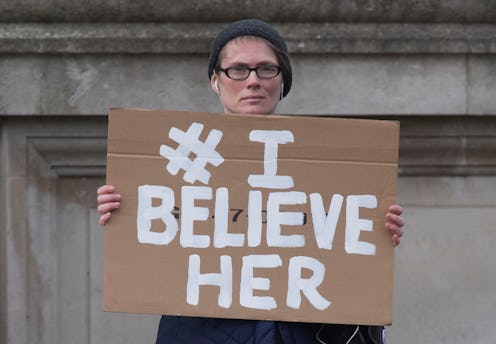News
Here's How You Can Support Sexual Assault Victims

According to RAINN (the Rape and Incest National Network,) someone is sexually assaulted every 98 seconds in America. One out of six women in America has been a victim of an attempted or completed rape. 21 percent of transgender, genderqueer, and gender nonconforming college students have been sexually assaulted. There's no arguing that sexual assault is a problem that needs to be addressed. Thankfully, there are professionals who work to protect victims and reduce sexual assault in America. If you're enraged by these statistics, there are ways you can support sexual assault victims every day.
President Donald Trump has declared April National Sexual Assault Awareness and Prevention Month. It's a good thing when attention is brought to sexual assault, but it's a little awkward that Trump is the one bringing it into public conversation, considering the considerable list of women who have accused Trump of sexual assault in the past. (The president has denied all of the accusations.)
Nonetheless, now is a good time as ever to be aware of resources for those who have been sexually assaulted and for those who wish to be supportive of victims. Here are some ways you can do that.
1. Believe Them
A very important part of helping sexual assault survivors is to believe their stories. Especially when a prominent figure is accused of sexual assault, detractors will come out to try to discredit the person alleging the crime.
It's so important to hear out victims. Even if you think certain facts about a story do not add up, you should not post online about why you think they are lying. It does not help accused nor the victim, and chances are you do not know all the facts.
2. Be Intentional About Your Language
Along with believing victims, being thoughtful about what you say to them is critical. Whatever you do, avoid blaming or accusing them of getting themselves into a harmful situation. Do not ask what they were wearing or how much they had to drink. These are not helpful questions, and could even make the victim feel like they were at fault.
Tell them that it is not their fault, and that they did not do anything to cause this to happen to them, which is accurate no matter the circumstances. Saying "I'm so sorry this happened to you" can go a long way. Simply listening to them without judgement makes a huge difference.
3. Help Them Find Resources
Organizations like RAINN are available to help sexual assault victims find the resources they need. If you know someone who has been affected by sexual assault, this is a great place to point them if they're looking for resources.
4. Advocate For Rape Kit Testing In Your State
There is a backlog of rape kits in many states. There are at least 100,000 untested rape kits, whether they're sitting in police department or crime lab storage facilities. It's important to learn about the backlogged rape kits in your state and advocate for politicians to pass reform. RAINN also provides a great resource to search for public policy and action in your state.
5. Stand Up For Victims
It is very easy to people to go on the internet and say what they want to about people who report sexual assault. However, it is not up for the public to judge what happens in those situations.
If you hear friends or family members who are quick to judge someone for reporting sexual assault, it's a good idea to remind them that they are not the ones going through all that the victim is experiencing and that they don't know the whole story.
6. Participate In A Sexual Assault Prevention Fundraiser
So many places across the country hold events to raise funding for various victim services. RAINN hosts a 5K walk in Washington. Many colleges across the country host Take Back the Night events to work to eliminate sexual assault and domestic violence.
7. Donate To Sexual Assault Prevention and Educational Resources
So many organizations are focused on ending sexual assault and protecting victims. RAINN is a popular one, but other resources include the Women's Freedom Center, which works to end sexual and domestic violence, Only With Consent, which works to stop sexual violence through consent education, A Voice For the Innocent, which provides a community and resources for sexual assault victims, and the National Alliance To End Sexual Violence, which advances legislation for the protection of women.
8. Volunteer For The National Sexual Assault Hotline
You can help sexual assault victims report crimes and direct them to a variety of resources by volunteering to answer hotline calls or provide administrative support to a resource center in your community.
There are so many ways to be supportive of sexual assault survivors in your everyday life, so please consider helping others not just during National Sexual Assault Awareness Month, but throughout the year.